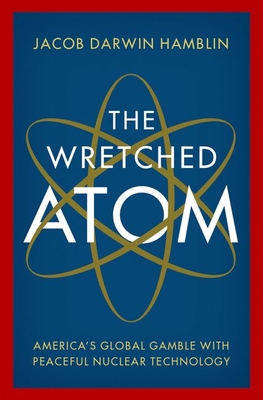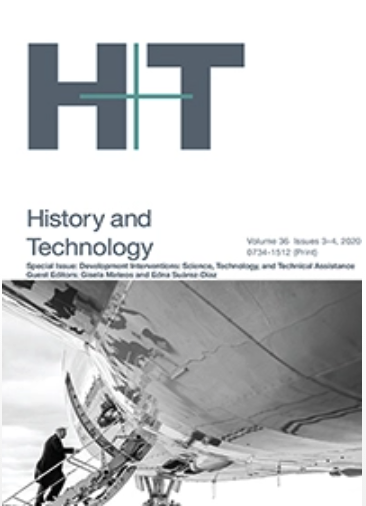 On a recent trip to Mexico I had a conversation that totally perplexed me about my academic life and work. An accomplished scholar from Europe asked me if I, as a historian of science, ever considered reading anything in the history of technology. “Yes, of course,” was my answer. She followed up with something like, “there is still discord between historians of science and historians of technology.” I mentioned that I couldn’t speak for others, but that I didn’t feel the discord. She continued with the question that I hoped she would ask: “But would you ever consider publishing in Technology and Culture“?
On a recent trip to Mexico I had a conversation that totally perplexed me about my academic life and work. An accomplished scholar from Europe asked me if I, as a historian of science, ever considered reading anything in the history of technology. “Yes, of course,” was my answer. She followed up with something like, “there is still discord between historians of science and historians of technology.” I mentioned that I couldn’t speak for others, but that I didn’t feel the discord. She continued with the question that I hoped she would ask: “But would you ever consider publishing in Technology and Culture“?
I hoped she would ask it because, indeed, I have published in Technology and Culture. And Isis (the journal of the History of Science Society). And History and Technology. And Osiris, the Journal of the History of Biology, Physics in Perspective, and lots of other journals that I’m happy to say have foiled others’ attempts to categorize my scholarship. (The science folks like their mythical creatures and deities: I have also published in Minerva, but so far not Centaurus). And let’s even mention that my work has appeared off these folks’ radar in other places, like Environmental History, Diplomatic History, and the International History Review!
If you don’t know anything about our little academic world, this should puzzle you — in fact, regardless of your background, it should puzzle you. But historians of science and technology will be quite familiar with it. It’s the lore of the disciplines. The historians of technology felt so shunned by the historians of science during History of Science Society meetings back in the 1950s that they — gasp! — broke off into their own group, founding the Society for the History of Technology. Battle lines were drawn, self-identification happened in droves, etc.
My question is, why do I need to care about this? Not only was I not a scholar then, I was not alive then. I have very different perspectives, and very different concerns. I do find it interesting in the way that I find most things from that period interesting: as a historian. What I find galling about it, though, aside from the fact that it still lingers more than half a century after SHOT was created, is what it says about scholarship in general. I actually like to cross boundaries from history of science, history of technology, environmental history, and even international relations. If I felt compelled to stay within my disciplinary walls, it would seem confining indeed. I realize that job candidates are often asked to self-identify (I remember this too well! ugh!), but I now have the luxury of not having to endure such inanity. I think it’s wonderful to have specialized associations and journals, but in no universe do I feel compelled to limit myself to one or the other.
This view is only strengthened as I watch colleagues in other disciplines (geography — oof!) suffer from discipline-definition wars, forgoing opportunities because they might raise a disapproving brow from someone on a hiring or tenure committee. I once offered a historical geographer the opportunity to have a roundtable on his recently-published book, in an environmental history forum, and he said no — and I strongly sensed that it was because he didn’t want to give ammunition to those who might claim he was a historian, not a geographer. Yikes. So, less exposure for his book.
A colleague of mine once commented during a Ph.D. oral exam that “a historian needs to have a big appetite.” Well said! He didn’t mean we should all eat more cookies, but that we need to read a lot, and see a broad range of issues, often way outside our own specialties. That doesn’t mean we have to write broadly, though that would be nice, but it means that even our specialized work will benefit from a broader historical context. I can’t even count how many manuscripts I’ve read that seemed to ask coyly, “even though I completely ignore anything else happening in the world, or what others have written on this, can you take my work seriously anyway?” The answer is no.
I would love it if I could simply say that the history of science vs. history of technology divide is a thing of the past. But I’m not sure. Do younger generations of scholars feel compelled to choose? Do they gravitate toward one or the other? I’d be curious to know if there are still significant reasons to have acrimony between the two fields. Are the reasons scholarly? Or is it about friendliness? When my colleagues compare the “vibe” of these two meetings, I tell them, “oh yeah? Try comparing foreign relations meetings to environmental history meetings!” One is a mostly white male, tie-wearing affair, and at the other, some folks show up in hiking boots and express pangs of guilt at the airplane fuel they burned to get there (also, lots of beards). Yes, there are social differences, but it’s all scholarship, and it’s all needed. Why on earth would I ignore one by choosing the other?



Leave a comment